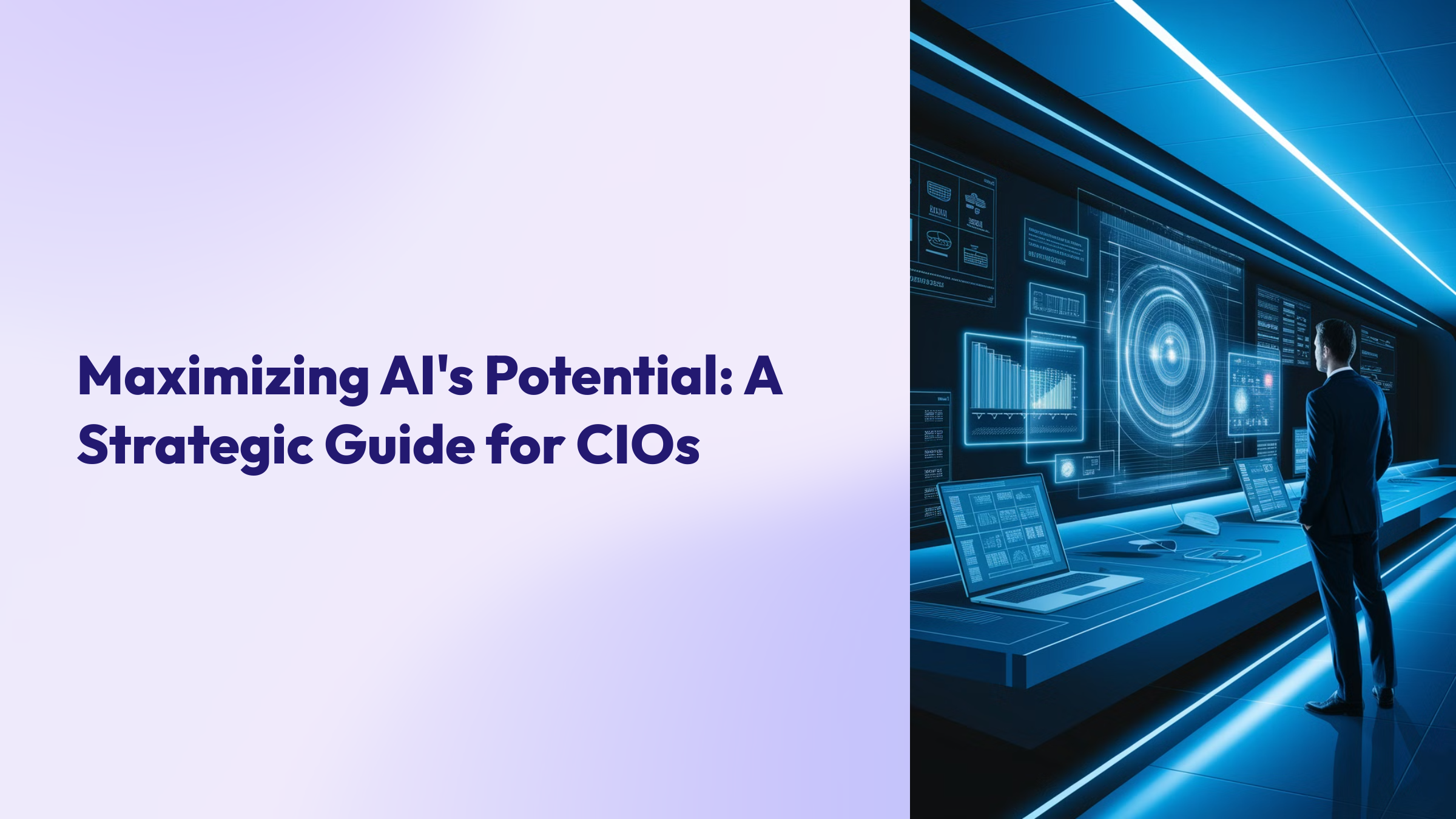Artificial Intelligence (AI) is no longer an emerging concept; it is a critical enabler of business transformation. As organizations increasingly adopt AI, CIOs face complex challenges: ensuring these technologies align with business objectives, create measurable value, and are implemented responsibly.
Before embracing AI, leaders must ask crucial questions:
For CIOs, these questions lay the foundation for success. This guide offers actionable insights for technology leaders to navigate AI’s complexities and make it an integral, impactful part of their organizations—whether optimizing operations, enhancing customer experiences, or driving innovation.
The enterprise AI market is projected to reach $155.2 billion by 2030, growing at a CAGR of 34.60%. This rapid expansion underscores the immense potential of AI to reshape industries and deliver significant business value.
Here’s how AI is driving transformation:
Despite AI’s potential, realizing its value requires addressing critical questions that define success in adoption.
Before committing to AI initiatives, CIOs should evaluate their readiness. These questions serve as a strategic checklist:
These aren’t just questions—they’re the foundation for building a strategic roadmap that ensures AI delivers measurable, sustainable value.
To maximize AI’s potential, CIOs should prioritize use cases that address critical business challenges. Here are four areas where AI delivers significant ROI:
With cyberattacks rising by 38% annually, AI is indispensable for real-time threat detection and response. Organizations using AI reduce breach detection times by 96%, fortifying defenses and staying ahead of evolving risks.
AI-powered chatbots and virtual assistants handle 80% of routine inquiries, reducing operational costs by up to 30%. This allows human agents to focus on complex issues, ensuring faster resolutions and personalized customer experiences.
Generative AI accelerates coding, testing, and debugging, reducing time-to-market by 50%. This speed gives businesses a competitive edge by enabling faster innovation and product delivery.
AI-driven systems reduce downtime by 20-40%, improving efficiency and reliability. Predictive capabilities allow organizations to proactively address issues, optimizing operations and minimizing disruptions.
By focusing on these use cases, CIOs can deliver measurable improvements in productivity, security, and operational efficiency.
A scalable infrastructure is critical for enterprise-wide AI adoption. According to Gartner, 75% of organizations will implement centralized AI platforms by 2026.
Key components of a scalable AI framework include:
A robust infrastructure ensures AI initiatives can scale, adapt, and deliver sustained value.
As AI adoption grows, so do ethical and regulatory challenges. According to Deloitte, 70% of organizations cite transparency and ethics as critical concerns in AI deployment.
Best practices for responsible AI implementation include:
A strong governance framework empowers businesses to innovate responsibly while maintaining accountability.
AI’s greatest potential lies in its ability to enhance, rather than replace, human creativity. By automating repetitive tasks, AI allows employees to focus on strategic, high-value work.
A PwC report estimates AI could contribute $15.7 trillion to the global economy by 2030, largely by unlocking workforce productivity. Cisco CIO Fletcher Previn summarizes it well:
“AI offers an opportunity to return time to people, enabling them to innovate, grow, and do their best work.”
AI is a transformative force, but its success depends on thoughtful planning, ethical implementation, and alignment with business objectives. By asking the right questions, prioritizing impactful use cases, and building scalable systems, CIOs can ensure AI drives sustainable innovation and measurable outcomes.
Ready to integrate AI into your business strategy? advansappz is here to guide you through the complexities of AI adoption, helping you build impactful, future-ready AI initiatives.
Contact advansappz today to begin your AI journey.
What are the most impactful AI use cases for enterprises?
Key areas include cybersecurity, customer support, software development, and infrastructure management.
How can AI improve workforce productivity?
By automating repetitive tasks, AI allows employees to focus on strategic and creative activities, enhancing productivity and innovation.
What role does governance play in AI adoption?
Governance ensures AI is used ethically, transparently, and in compliance with regulations, maintaining trust and accountability.
What ROI can businesses expect from AI?
Organizations effectively using AI report 20-30% improvements in efficiency, cost savings, and customer satisfaction.
How can advansappz support AI adoption?advansappz offers end-to-end AI solutions, from strategy development to implementation, ensuring responsible and impactful adoption.
Transform Your AI Strategy Today
Connect with our AI specialists to discuss tailored solutions for your business challenges. Let’s build a roadmap for impactful AI adoption.

From strategy to implementation, explore how our end-to-end services can empower your organization with cutting-edge AI capabilities.
Most Popular





Subscribe To Our Blog to Receive Weekly Updates
You may also like





Fill out the form below, and one of our experts will reach out to you shortly.
Thank You for Your Inquiry!
We appreciate you reaching out to us! Our experts are reviewing your request and will contact you shortly to discuss how we can support your business needs.
In the meantime, feel free to explore our website for more insights into our offerings: advansappz.
Thank you for considering us as your trusted partner! We look forward to connecting with you.